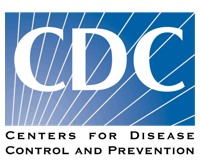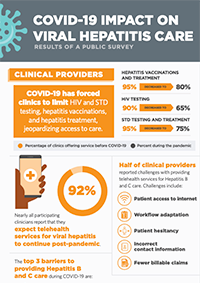A letter to our membership concerning COVID-19
Dear friends,

As the U.S. faces growing numbers of coronavirus cases, I send my utmost appreciation to those of you working on the front lines to protect and care for the most vulnerable among us. NVHR will be compiling resources for organizations seeking to update their viral hepatitis prevention and management practices. If your organization has created protocols for addressing viral hepatitis in light of COVID, and you would like to share these with the rest of the community, please feel free to email me and I will be happy to post them on our website. For those working in the harm reduction space, I direct you to a fantastic resource created by our colleagues, addressing harm reduction practices and operations amid the pandemic…
Some of you have asked what this pandemic will mean for our viral hepatitis advocacy efforts in 2020. As I often tell lawmakers, diseases do not exist in a vacuum, and as such, nor can our response. While attention and resources are rightfully focused on the COVID response right now, I, along with other federal hepatitis advocates, continue to fight for a comprehensive response to viral hepatitis at the highest levels of our government. As we are currently amid federal appropriations season, we are working day in and day out with members of Congress to ensure our federal agencies receive sufficient funding in 2021 to address viral hepatitis.
NVHR is also continuing to advocate for viral hepatitis policies at the state level, supporting several states in elimination planning, harm reduction advocacy, and treatment access efforts in Medicaid and correctional settings. While hepatitis advocacy efforts will be moving to more virtual and remote platforms, our activities will continue, and as always, will be much more impactful when done in concert with you. I invite you to attend a webinar today on State Viral Hepatitis Advocacy, which NVHR will be co-hosting with our partners at the Hepatitis B Foundation. It will provide tangible strategies and will feature seasoned viral hepatitis advocates who have had success in their respective jurisdictions. I also invite you to participate in NVHR monthly grassroots advocacy calls to stay abreast of developments in viral hepatitis advocacy as legislative sessions continue.
Stay tuned for opportunities in the coming weeks and months to engage in viral hepatitis advocacy from the comfort of your home, as NVHR will be launching digital awareness days on social media, holding online briefings, and leading phone banking efforts targeting elected officials. The silver lining of this decentralized approach to advocacy, is that it will create opportunities for you to join us from anywhere in the nation.
Together we can and will continue to drive progress towards hepatitis elimination.
Please take good care of yourself and your loved ones during these challenging times. And as always, do not hesitate to reach out if NVHR may support you in your activities.
In solidarity, Lauren
Lauren Canary, MPH
Director | National Viral Hepatitis Roundtable
A program of HEP

Important CDC Links for At Risk Populations
Are You at Higher Risk for Severe Illness?
About Coronavirus Disease 2019 (COVID-19)
LIVE UPDATES from CDC: Situation Summary from the CDC
NVHR Advocacy and Analysis

One Pager: State of Viral Hepatitis During COVID-19
In collaboration with the National Viral Hepatitis Roundtable (NVHR), the Hepatitis Education Project (HEP), NASTAD, Hep B United, Hepatitis B Foundation, and National Association of County Health Officials (NACCHO), HepVu created a factsheet outlining the impact of the COVID-19 pandemic on viral hepatitis and the experiences of clinical providers, community-based organizations, and health departments during COVID-19.
Survey: COVID-19 Impact on Viral Hepatitis Care
NVHR and other leading viral hepatitis advocacy organizations launched a survey in June to assess the impact of COVID-19 on viral hepatitis care. The results are stark and show that public health departments and community organizations have had to limit hepatitis treatment as a result of the pandemic. In particular, nearly two-thirds of community-based organizations providing viral hepatitis services have received inadequate or no funding to adapt services during COVID-19. In particular, nearly two-thirds of community-based organizations providing viral hepatitis services have received inadequate or no funding to adapt services during COVID-19. Furthermore, more than half of community-based organizations survey had to furlough or lay off staff or reduce operations due to COVID-19. The survey shows that vaccinations, testing, and treating viral hepatitis has decreased as a result of COVID-19.
While addressing the COVID-19 pandemic is of utmost importance, NVHR strongly supports actions that will ensure that the viral hepatitis public health crisis is actively addressed and urges support to combat the viral hepatitis epidemic.
Additional Resources Concerning Coronavirus
- Interim Guidance for Syringe Services Programs
- COVID-19, Surface and Disinfection for Syringe Service Providers and Other Harm Reduction Providers
- Coronavirus/COVID-19 Resources to Stand Against Racism
Asian Americans have been targeted by racism and xenophobia related to the coronavirus or COVID-19. We offer the following resources in response to this hate. - Project ECHO COVID-19 Response
During this time of global crisis, ECHO model has a special role to play in quickly helping to connect experts and frontline healthcare professionals. To help our partners’ navigate the various ways the ECHO Institute is helping, we have created numerous resource lists of our COVID-19 activity around the world. - World Hepatitis Alliance – COVID-19 – Information for people living with viral hepatitis
- COVID-19 Guidance for People Who Use Substances
- Coronavirus (COVID-19) Guidance: Clinicians & Opioid Treatment Programs
- Coronavirus (COVID-19) Guidance: Patients Engaged in Substance Use Treatment
- These Twitter accounts may also be of interest: @YaleADM, @YaleGHJP, @crackdownpod.
- Syringe Services and Harm Reduction Provider Operations During the COVID-19 Outbreak
- Safer Drug Use During the COVID-19 Outbreak
- Hepatitis Australia Fact Sheet: COVID-19 Information for people affected by hepatitis B or C
- Harm Reduction in the Time of Coronavirus
- Harm Reduction Amidst Pandemic
- Hepatitis Grand Rounds On-Demand Catalog by Date
Videos on Coronavirus and the Liver
- Dr. Saab Coronavirus and the Liver Overview
- Dr. Saab Coronavirus and the Liver Questions
- COVID-19: A Message to the Community, Michael Ninburg, Executive Director, Hepatitis Education Project
- Viral Hepatitis: COVID-19 Considerations, Robert G Gish, MD